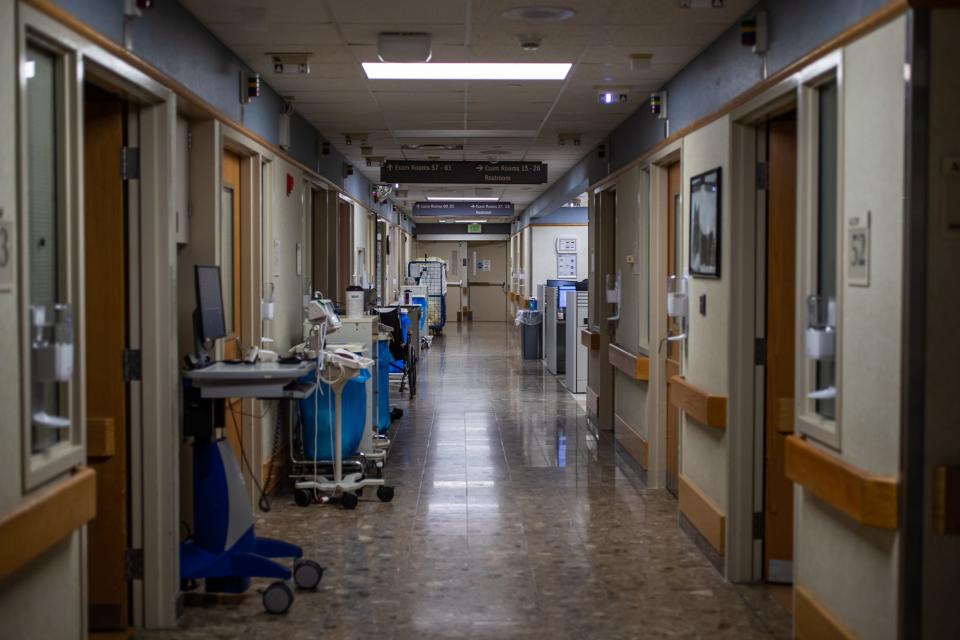Op/Ed: High costs for care at Indiana's nonprofit hospitals not very charitable
Nonprofit hospitals are supposed to operate like charities, providing affordable health care to those in need while improving their communities in exchange for massive tax breaks. But the truth is that across the country ― including here in Indiana ― nonprofit hospitals are implementing toxic policies that put profits ahead of patients.
Recently, egregious, profit-seeking behaviors of nonprofit hospitals across the country have been spotlighted in investigations and reports by The New York Times, Axios, the documentary film inHospitable, Innovation for Justice and many others. Indiana health care consumers ― like those across the country ― have felt the impacts of nonprofit hospitals acting like big businesses.
Indiana nonprofit hospitals have a “fair share deficit” of $513 million dollars in aggregate. In other words, nonprofit hospitals in Indiana received a whopping $513 million more in tax breaks than they spent on charity care for low-income patients and community benefits. This isn’t surprising given the fact that nonprofit hospitals spend less on charity care than for-profit hospitals of comparable size.
Related:Indiana lawmakers try to force hospitals to lower prices
Take a look at Indiana University Health, the largest hospital system in the state. In 2020, the nonprofit hospital system, which charges the second-highest prices statewide, reported $1.2 billion in profits. IU Health Methodist University charges patients 4.7 times more than it costs the hospital to provide care. And it’s not just IU Health. Indiana ranks sixth for hospital price disparities — ahead of states with much higher costs of living like New York, California, and Massachusetts.
Not only are Indiana’s nonprofit hospitals charging patients outrageous markups, they are also flouting federal price transparency laws. The latest report by Patient Rights Advocate shows less than a quarter (22%) of Indiana’s hospitals in compliance with federal regulations requiring all hospitals to post their prices online and make them easily accessible and searchable.

Worse, as a result of Indiana’s weak debt protection policies, Hoosiers are at risk of becoming victim to devastating debt collection methods if they can’t pay their medical bills, including having their wages garnished, bank accounts seized or homes foreclosed. Even if a patient qualifies for reduced cost or free care, they could see their finances destroyed since hospitals in Indiana are not required to establish charity care policies or notify patients about those policies.
Fortunately, Indiana elected officials ― both at the Statehouse and in Washington, D.C. ― recognize too many nonprofit hospitals are taking advantage of vulnerable patients and taxpayers and are taking action to hold them accountable.
Op/Ed:When it comes to health care, Indiana Republicans ignore free market principles
Indiana’s own Rep. Victoria Spartz recently joined forces with Washington representative and chair of the Congressional Progressive Caucus Pramila Jayapal to introduce legislation that would help stop anti-competitive practices by nonprofit hospitals. As Rep. Spartz said, “More than one of eight Americans and one of six Hoosiers are in collections due to medical debt, which is unacceptable. Nonprofit hospital status should not be a loophole to avoid antitrust enforcement.” This sentiment is being echoed here in Indiana, where state lawmakers are prioritizing bills that will hold nonprofit hospitals accountable this legislative session.
I am encouraged by these efforts and urge lawmakers and Gov. Holcomb to do everything in their power to ensure Indiana’s nonprofit hospitals act like nonprofits and provide the affordable care their communities demand. It’s time for statewide changes that will make a difference, including prohibiting hospitals from pursuing toxic debt collection practices, setting standards for charity care eligibility and obligations, and enacting standards and ceilings for common abusive practices like high interest rates on medical bills and reporting on medical debts prior to insurance determinations. Hoosiers deserve nonprofit hospitals that put patients and their communities first.
Jim Manley is former senior advisor for former Senate Majority Leader Harry Reid and current board member for Consumers for Quality Care.
This article originally appeared on Indianapolis Star: 'Outrageous' fees outpace charity care at Indiana nonprofit hospitals

